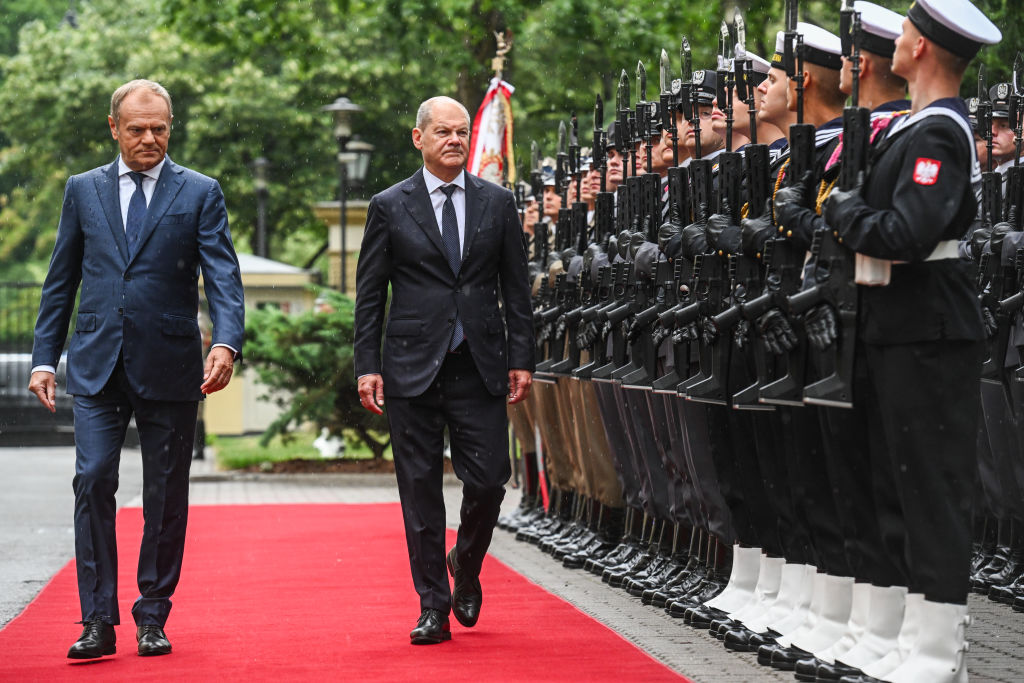The reparations war that could break the EU

Getting Germany to pay full reparations to Poland was always going to be a politically herculean task, and the PiS’s all-or-nothing approach was doomed to failure. Yet even in trying to reconcile with a Polish government that had returned to its camp after years of PiS rule, Scholz offered Poland – which suffered proportionally more civilian casualties during the war than any other country – little more than token gestures and nice words about German guilt, while relying on flimsy, decades-old legal arguments. This attitude plays into a long-standing and convenient logical fallacy that has allowed modern Germany to break away from its Nazi past: that because it has reformed ideologically and spiritually since the Third Reich, it deserves to be tacitly absolved of its sins without having to pay the full bill for them.
This attitude, which barely began with Scholz, underscores the ongoing lack of understanding among modern German politicians when it comes to Poland’s current political identity. While wartime reparations are not necessarily a concern for every Pole, Scholz’s unserious approach to the issue reflects a much broader concern among Poles about Western Europe’s ongoing inability to treat their country with dignity on the international stage – especially at a time when Poland has become so important in combating the growing threat to the continent from Russia.
This does not mean that Germany has completely dismissed the reparations issue. In 1992, two years after German reunification, Berlin actually paid Poland part of the reparations it was entitled to and granted Polish victims of National Socialism around 295 million euros before additional funds were paid out for Poles who had been forced into slave labour in the years that followed. But throughout its relationship with Germany, Poland has had to constantly reconcile its historical grievances with the needs of the present. In 2004, shortly after Poland joined Germany as an EU member, made a statement confirmed that it had lost its right to full reparations in 1953. In the interests of European integration, Poland found it more advantageous to to leave history behind and be content with what it had received from Germany, at least for the time being.
But on the eve of another opportunity to receive the compensation their country deserves, the current political interests of Poland’s leadership appear to have once again overshadowed a sincere desire for full historical justice. Addressing Poland’s most pressing concerns, Tusk said he had heard what he needed to hear from Scholz and agreed to virtually put aside past mistakes in return for Germany’s help with the most pressing security problems on Poland’s doorstep.
But it would be in Tusk’s interest to keep up the pressure on Scholz to meet Poland’s demands. Arguments that he has been too conciliatory towards Germany and other European heavyweights have been a godsend for PiS and other right-wing parties in the past. And although Tusk’s party came out on top in Poland in last month’s European elections, the far-right Confederation Party’s strong showing should set off alarm bells for him about the future of the Polish electorate. His failure to push through meaningful reparations at such an opportune time in Poland’s relations with Germany would jeopardise his political prospects not only with the Polish right but also with parts of his own base. While it may indeed be the case that Poland has no solid basis under international law with regard to reparations claims, as Polish Foreign Minister Radosław Sikorski stated in February this year, “the issue of moral, financial and material compensation has never been implemented.”
“In the interests of European integration, Poland was forced to let go of history and be content with what it had received from Germany.”
This point is particularly important because the reparations process at the end of the war was undeniably marred by politics and corruption. At Potsdam in 1945, the Western Allies granted the USSR the right to make reparations payments to Germany on behalf of Poland, which became a Soviet satellite state after the war. Poland received only a portion of the machinery, raw materials, and military equipment that the Soviets seized from Germany on its behalf after the war, until, of course, the USSR forced Poland to make its 1953 declaration to release communist East Germany from further obligations. As a result, the country that would have likely benefited most from its full share of reparations was prematurely deprived of it—a reality that, while immutable in the eyes of the law, remains otherwise indefensible to this day.


